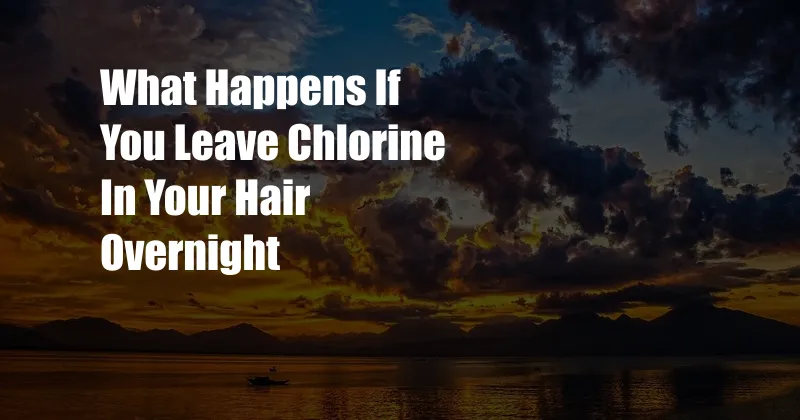
What Happens if You Leave Chlorine in Your Hair Overnight?
As a seasoned swimmer or pool enthusiast, I’ve often wondered about the consequences of leaving chlorine in my hair overnight. Over the years, anecdotes of weakened hair and scalp irritation have circulated, but I sought scientific evidence to fully understand the potential effects.
Chlorine, a chemical commonly used to disinfect swimming pools, can have a drying effect on the hair when left in for extended periods. Overnight exposure can further exacerbate these effects, potentially leading to hair damage and scalp issues.
Chlorine’s Drying Effect
Chlorine has the ability to strip the hair of its natural oils. These oils act as a protective layer, preventing moisture loss and maintaining the hair’s strength and elasticity.
When chlorine remains in the hair overnight, it continues to penetrate the hair shafts, leaching out essential oils. This can result in dry, brittle hair that is more prone to breakage and split ends. Additionally, the scalp may become irritated due to dryness.
Potential Damage to the Hair Cuticles
The hair cuticle, the outermost layer of the hair, serves to protect the inner cortex from damage. Chlorine exposure can cause the cuticle to become raised and rough, leaving the hair susceptible to damage from external factors, such as heat styling and brushing.
Over time, repeated chlorine exposure can weaken the hair cuticles, making them less effective at protecting the hair’s inner structure. This can lead to increased hair breakage, thinning, and a dull appearance.
Increased Risk of Scalp Irritation
In addition to its drying effects, chlorine can also irritate the scalp. The chemical can cause inflammation and dryness, leading to symptoms such as itching, redness, and flaking.
Leaving chlorine in the hair overnight compounds these effects, giving it more time to penetrate the scalp and cause irritation. Individuals with sensitive skin or existing scalp conditions may be more prone to experiencing these adverse reactions.
Tips for Minimizing the Effects of Chlorine on Hair
While it’s not always possible to avoid chlorine exposure, there are steps you can take to minimize its impact on your hair:
Rinse your hair with clean water after swimming. This helps remove residual chlorine from your hair and scalp. Consider using a clarifying shampoo to further cleanse your hair.
Apply a deep conditioner to replenish lost moisture. Leave it in for at least 10 minutes before rinsing.
Expert Advice for Healthy Hair after Chlorine Exposure
Hair care experts recommend the following additional measures to protect your hair from chlorine damage:
Use a swim cap to prevent direct contact between your hair and chlorine.
Avoid washing your hair with hot water. Hot water can further strip the hair of its natural oils.
Frequently Asked Questions
Q: Can chlorine cause hair loss?
A: While chlorine exposure can weaken the hair and make it more prone to breakage, it is not likely to cause permanent hair loss.
Q: How often should I clarify my hair after swimming in a chlorinated pool?
A: If you swim frequently, consider clarifying your hair every 1-2 weeks. For occasional swimmers, clarifying once a month should be sufficient.
Q: What type of hair is most susceptible to chlorine damage?
A: Bleached, colored, or naturally dry hair is more vulnerable to damage from chlorine.
Conclusion
Leaving chlorine in your hair overnight can have detrimental effects, leading to dry, weakened hair and scalp irritation. By following the tips and expert advice provided, you can minimize the impact of chlorine exposure and maintain healthy, vibrant hair.
Are you interested in learning more about hair care after swimming in a chlorinated pool? Share your questions or experiences in the comments section below!